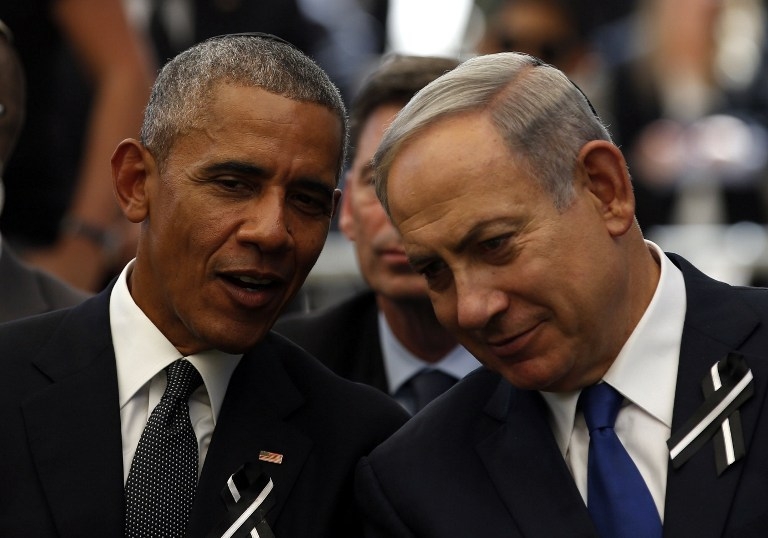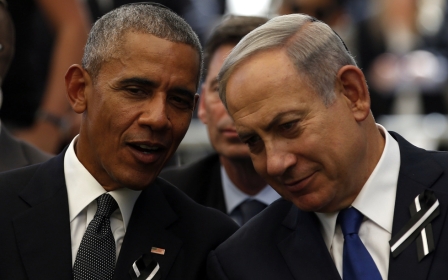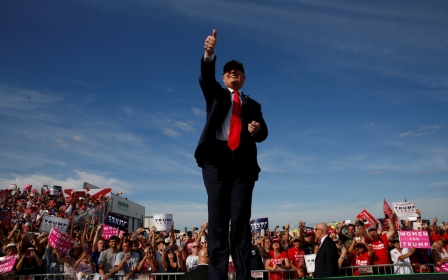Obama's last 70 days: Israel on pins and needles

Former Israeli prime minister Ehud Barak once famously described Israel as “a villa in the jungle”. He meant to say that Israel was a rich, advanced society in a hostile and dangerous neighbourhood.
But nowadays, the villa’s management is much less worried about its neighbours.
There is no one serious force, which currently threatens the very existence of Israel and the country’s strategic posture has never been better
Deterred by Israel, Hezbollah is also pre-occupied with the tragic civil war in Syria. So is the Islamic State (IS) and other militant groups on Israel’s Golan border with Syria.
In the south, Hamas has neither the capabilities nor the wish for the time being to slide into another round of violence with Israel. Along the Egyptian border, IS’s “Sinai Province” is under constant pressure by Egyptian security forces, and Israel is not on its agenda.
Iran has reduced its nuclear programme. Its security forces are overstretched in the wars in Syria, Iraq and Yemen, and its top political and religious leaders are arm-twisting and playing power games ahead of the upcoming US presidential election.
The peace treaties with Jordan and Egypt are in place and security cooperation is stronger than ever.
Further afield, the fear of Iran and its desire for regional hegemony in recent years has pushed the leaders of Saudi Arabia, Bahrain and UAE to be closer to the Jewish state.
Oman and Qatar have clandestinely maintained very close intelligence and security ties with Israel. All these nations are seeking Israeli military and intelligence-gathering technologies. As a result, former Israeli military men and intelligence experts are engaged in thriving businesses in these countries.
All in all, there is no one serious force – be it a state or an organisation – which currently threatens the very existence of Israel, and the country’s strategic posture has never been better.
Frenemies in the jungle
But instead of capitalising on its authoritative edge and using it to enhance its security and advance the peace process with the Palestinians, the jungle villa management is wary of the jungle keeper, its best friend.
The very same protector friend that has, for years, helped it build the villa and its fortress, showering Israel with the best weapons available, and protecting it.
The right-wing government, first and foremost Prime Minister Benjamin Netanyahu, lives in fear and trepidation of the American administration led by President Barack Obama.
It is focused on the day after the US elections, which are being held in two weeks. For Netanyahu, the period between 9 November and 20 January, when Obama leaves the White House and is replaced by the new president (as it seems, the first female president) will be a time of tactical plotting and strategising.
The method of fear, hesitation and search for enemies – real or imaginary – are, for Netanyahu, a means to divert public attention and recruit the masses to his corner, something he excels at and has demonstrated his talent for in all three of his terms since 2009.
Netanyahu’s very being involves rolling from one crisis to another, shaking off pressure and buying time, hoping that he will not have to pay a heavy price one day.
Arrogance as a strategy
As the past has shown, it’s a strategy that works. At the beginning of Netanyahu’s second term, and Obama’s first, when the Israeli premier truly feared the American president’s heavy hand, he delivered his famous Bar Ilan speech, in which he declared his vision for “two states” – a Palestinian state beside an Israeli state.
Under this pressure, Netanyahu was forced to freeze settlement construction for half a year and agreed to hold negotiations with the Palestinian Authority. But Palestinian President Mahmoud Abbas didn’t understand and failed to take advantage of this window of time to test Netanyahu’s intention or call his bluff.
Not long after this experience, Netanyahu gained self-confidence, and his arrogance took control. He did not hesitate to intervene in internal US politics and made no effort to hide his support for Republic nominee Mitt Romney in the 2012 elections. He went on a crusader mission to Congress and after American public opinion, against Obama and the nuclear deal being forged with Iran.
Netanyahu humiliated Obama like no other leader of a friendly state had ever dared to do to an American president (with the exception of the new president of the Philippines, Rodrigo Duterte, who called Obama a “son of a bitch” and told him to “go to hell”.)
But rather than punish Netanyahu, last month Obama showered his frenemy with $38bn in a new memorandum of understanding signed between the two states for the next 10 years.
Irritating the forest king
Despite the hostility between Obama and Netanyahu, the relationship between the states – on every level, and most certainly in defence and intelligence – has not yet suffered.
Netanyahu can smile in satisfaction and tell himself: I acted ungratefully and I irritated the king of the forest to the best of my ability, and I lost nothing. In fact, I kept on getting (almost) everything I wanted.
But the keyword here is yet. Netanyahu knows that there is still a danger that Obama will seek revenge – a danger that might have grown stronger. Netanyahu, Defence Minister Avigdor Lieberman, and the other ministers in the cabinet are biting their nails in real concern.
During the 70-day transition period between election and inauguration, Obama will be free of pressure from all things political, electoral, party, domestic, lobbying, and donor-related. He can allow himself to make decisions according to his own conscience and leave a legacy that may pave the way for the new administration to follow suit.
The prime minister’s fear, evident in what sources tell me is his pessimistic outlook, is that the Obama administration will support – or at the very least not veto – any move by France or another state to submit a resolution to the UN Security Council to recognise the State of Palestine or condemn the Israeli settlements.
If the Security Council were to adopt such a resolution, it would pave the way for further decisions of the kind, which might set into motion an infrastructure to impose sanctions against Israel.
As long as these kinds of decisions are adopted in the General Assembly, which is not binding, Israel has the power to ridicule, disrespect, ignore, and complain about them, and continue with its settlement policy and deceive the international community.
But a resolution in the Security Council is nothing to laugh at.
Going in blind
And so, the senior Israeli political echelon is trying to get information, even just a hint, of what the US president has his eyes on. They are, according to my sources, using every resource available to them, every leverage of influence or source in the White House and outside it – people and organisations – to figure out what Obama plans to do.
They don’t even know whether the president has already decided, and is just keeping it to himself, or if he is still considering his options
As of yet, their efforts have been fruitless. The prime minister and his cabinet ministers have no idea what is going to happen in those 70 days. They don’t even know whether the president has already decided, and is just keeping it to himself, or if he is still considering his options.
It’s possible that even Obama himself doesn’t know what his move will be.
The Israeli defence establishment is just as concerned by this question. If the US joins, or chooses not to prevent, a Security Council decision against Israel, it will be a boon for Abbas, who has made the diplomatic fight for statehood his lifeline.
And it will give him just the headwind he needs to continue that process, to force Israel into an arrangement with the backing of the international community.
But if the US continues to defend Israel in the Security Council, it could spell the end for Abbas’ rule.
If that happens, the frustration and despondence over the lack of international support - and the realisation that Netanyahu and the Israeli government are only going to continue strengthening their hold on the West Bank - might lead the Palestinians to the conclusion that the only means left to them is escalating violence and terror. A new all-encompassing violent resistance may spark again.
- Yossi Melman is an Israeli security and intelligence commentator and co-author of Spies Against Armageddon.
The views expressed in this article belong to the author and do not necessarily reflect the editorial policy of Middle East Eye.
Photo: US President Barack Obama speaks to Israeli Prime Minister Benjamin Netanyahu during the burial ceremony of former Israeli president Shimon Peres at Mount Herzl Cemetery in Jerusalem on 30 September 2016 (AFP)
New MEE newsletter: Jerusalem Dispatch
Sign up to get the latest insights and analysis on Israel-Palestine, alongside Turkey Unpacked and other MEE newsletters
Middle East Eye delivers independent and unrivalled coverage and analysis of the Middle East, North Africa and beyond. To learn more about republishing this content and the associated fees, please fill out this form. More about MEE can be found here.





